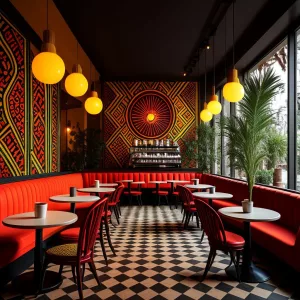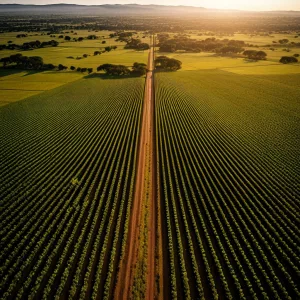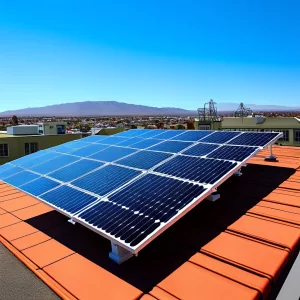In May 2025, fuel prices in South Africa dropped, giving a muchneeded break to many people and businesses. This fall happened because global oil prices went down due to trade troubles and a slowing world economy. Petrol became cheaper by 22 cents per litre, diesel by about 42 cents, and paraffin by 31 cents, helping families save money. Though the rand weakened and some levies rose, the lower fuel costs brought a fresh wave of hope and relief across the country. For many South Africans, this is a small but bright moment amid ongoing economic challenges.
From Local Café to Global Influence: How Tashas Nurtures South African Talent for International Success
Tashas started as a small café in Johannesburg, where Natasha Sideris created a warm, creative space full of care and culture. The brand grows South African talent by teaching real skills, offering mentorship, and helping staff move abroad with strong support. They believe in lifting people up from within, giving everyone chances to learn, lead, and shine on the world stage. Through kindness and smart training, Tashas turns local workers into confident global ambassadors, spreading South African spirit far and wide.
Since 2000, the African Growth and Opportunity Act (AGOA) has helped South African farmers sell fruits like avocados, wine, and citrus to the United States without paying extra taxes. This chance boosted farming communities, especially small farmers and women, by opening up new markets and encouraging growth. But recent U.S. tariffs threaten these gains, making it harder for farmers to compete and putting many livelihoods at risk. Still, South African farmers remain strong and hopeful, working hard to face these new challenges and keep their communities alive.
Cape Town’s boatbuilding industry is a shining example of skill and tradition mixed with new technology. It creates beautiful, strong boats that are loved worldwide and supports thousands of jobs in the city. But now, new tariffs on exports, especially to the US, threaten this important work and the people who depend on it. Despite these challenges, boatbuilders, city leaders, and innovators are coming together to protect this proud craft. Their passion and teamwork fuel hope that Cape Town’s boatbuilding legacy will sail on strong into the future.
Cape Town’s new property tariffs for 2025/26 bring fresh hope to many homeowners. The city is easing charges for people with homes valued between R2.5 million and R7 million, especially helping pensioners with limited income. Electricity costs will rise only slightly, and cleaning fees are going down, making bills fairer for all. These changes show Cape Town’s care for longtime residents, balancing smart city growth with kindness so everyone can feel secure in their homes.
South Africa decided not to raise VAT by 0.5% after a big public outcry. People worried the extra tax would make life harder with rising prices and many without jobs. Protests, legal fights, and political pressure made the government change its mind. This choice shows how South Africans’ voices can shape important government decisions. Now, the country faces new challenges to find money without hurting its people.
South Africa’s R100 billion Transformation Fund is a bold government plan to help blackowned businesses and small entrepreneurs grow by investing R20 billion each year for five years. It aims to fight inequality, create jobs, and build a fairer economy where everyone can take part. The fund invites people from all over the country to share their ideas, showing a strong commitment to working together. By mixing government support with private business knowhow, it hopes to open new doors for communities that were left behind for too long. This initiative is a fresh step toward healing the past and building a brighter future for all South Africans.
In the Western Cape, paying vehicle licence fees is more than just a routine task—it helps keep roads smooth, safe, and ready for everyone. These fees fund road repairs and upgrades that support farmers, tourists, and daily commuters alike, making life easier and boosting the local economy. The government listens to residents’ ideas before changing fees, turning road funding into a shared effort that connects communities and builds a better future. Roads here aren’t just paths; they’re a symbol of teamwork and hope for what’s ahead.
South African nonprofits face a big deadline between April 15 and May 31, 2025, to submit important tax reports called IT3(d). This report keeps their ability to give donors taxdeductible receipts, which helps raise money and build trust. Missing the deadline can cause fines and loss of this key status, hurting their work and the communities they serve. Many groups are working hard, using new tech and teamwork to meet the deadline and stay strong. This yearly challenge pushes nonprofits to be more professional and transparent, securing their future.
South Africa has set bold new rules for 2025 to make workplaces fairer by ensuring more black people, women, and people with disabilities hold jobs, especially in management and skilled roles. These rules target 18 industries with clear goals and deadlines, pushing companies to act or face penalties. This fresh push builds on decades of struggle to fix past unfairness, aiming to turn good intentions into real change. It’s a hopeful step toward workplaces where everyone feels they belong and can succeed.
Good news for drivers in South Africa! Fuel prices might drop in May, giving some muchneeded relief to those feeling the pinch at the pump. This possible decrease comes from falling international oil prices and a stronger rand, which makes fuel cheaper. Recent data shows that there’s been a significant overrecovery in fuel prices, hinting at a second month of savings. As people fill up their tanks, they can feel a glimmer of hope amidst the ups and downs of the economy and global trade.
In South Africa, powerful couples are making waves in business and society. Patrice and Precious Motsepe shine in mining and fashion, using their wealth to help communities thrive. Koos Bekker and Karen Roos blend media and design for a vibrant lifestyle brand, while Adrian and Dr. Lauren Gore revolutionize health and insurance to promote wellness. Entertainment icons Connie and Shona Ferguson create beloved TV shows that uplift local talent, and Trevor Manuel and Maria Ramos shape economic policies for a better future. Together, these couples demonstrate how teamwork can drive innovation and positive change in their country.
South Africa is making important changes to its private security regulations to improve safety and accountability without taking away guns from security guards. With over 600,000 security officers contributing billions to the economy, the proposed rules aim to ensure they have the right tools and training while preventing misuse. While some worry about costs, many professionals believe these changes will raise industry standards and weed out bad practices. As discussions continue, the future of this vital sector hangs in the balance, reflecting a broader push for accountability in society.
Cape Town residents are finding hope in solar energy through GoSolr’s subscription model, which promises to cut electricity bills while ensuring users save more than with Eskom. This easytounderstand plan guarantees no financial risk; if savings fall short, GoSolr covers the difference. With Cape Town’s sunny climate, families not only gain financial relief but also energy independence, especially during power outages. By choosing solar, they are taking a big step toward a greener future and helping the planet at the same time. It’s a bright solution for a brighter tomorrow!
In South Africa, rising worries about social unrest are echoing loudly from busy cities like Johannesburg and Durban. The main issues fueling this unrest include deep inequality, bad leadership, and high youth unemployment, with many young people feeling hopeless and angry. The failing water services only add to the frustration, leading to protests and unrest that disrupt daily life and business. As citizens and leaders call for change, there’s a powerful hope that South Africa’s resilient spirit can pave the way for a brighter and fairer future.
China’s talks with Saudi Arabia and South Africa are like building strong bridges between nations. These discussions focus on important areas like energy and digital trade, helping China grow its influence while navigating tough trade challenges with the U.S. In Saudi Arabia, China is eager to secure energy supplies, while in South Africa, they aim to boost cooperation within global groups like the G20. Despite the ongoing trade war with the U.S., these partnerships show China’s commitment to supporting growth and connection in a rapidly changing world.
















